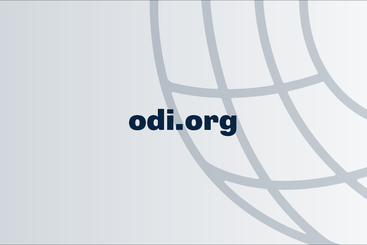The Development Policy Review (DPR) team doesn’t stop over the summer. The latest DPR issue has just been published and here is a summary of what you are going to find in the 11 new articles.
We have been asked: why a September issue when it’s published in August? The reason is simply a legacy of having an online and printed version: it took a month for the printed edition to reach libraries. As you might know by now, DPR is now an online-only journal, so this lag between the online and printed versions should no longer apply. We are working to fix this misleading labelling of each issue by the end of the year.
As a reminder, DPR is a peer-reviewed journal that focuses on the links between research and policy in all aspects of international development in low and middle-income countries and across the spectrum of social science disciplines.
The topics covered in the 11 articles of the new September issue include:
- policy influence on the design of education programmes in Ethiopia;
- impact and effectiveness of anticorruption campaigns and interventions (a case study on the cotton trade in Mali, one on Papua New Guinea and a final one on the extractive industry in Ghana);
- risk assessment for social assistance and humanitarian relief;
- rural mechanisation;
- smart city implementation;
- aid fungibility (with a case study on Rwanda)
- environmental legislation for protected natural areas and fire management in the Amazon Basin;
- female participation in microfinance institutions and its impact on performance.
More specifically on the rationale, findings and recommendations:
Policy influence on the design of education programmes in Ethiopia
In their open access article, Shelby Carvalho, Amare Asgedom and Pauline Rose examine how federal, regional and international donor actors negotiated their interests in relation to Ethiopia’s national quality education reform programme, the General Education Quality Improvement Programme for Equity (GEQIP-E). They find that the federal government was able to leverage considerable political influence over high-level priorities and the framing of GEQIP-E. Large donors leveraged financial influence to exclude some specific priorities, while smaller donors were able to draw on social influence and technical expertise to include priorities aligned with their interests. Regional governments – which are responsible for policy implementation – were largely excluded from the reform design process.
Small-scale cross-border trade and anti-corruption interventions
In their open access article, Jacqueline Klopp, Melissa Trimble and Eleanor Wiseman analyse which anti-corruption interventions tend to work to improve the conditions of small-scale border traders in East Africa. They find that simplifying and reducing formal border procedures, reducing tariffs, and improving information desks and complaints mechanisms are all needed to enhance access and accountability. Programmes that support access to capital, business support, networking and knowledge around border procedures have positive impacts, as do those that promote strong associations to put to the government the specific needs of small-scale traders.
Impact and awareness of anti-corruption campaigns
Caryn Peiffer and Grant Walton investigate the impacts of anti-corruption messages on citizens' willingness to report corruption in Papua New Guinea in their open access article. They find that respondents were more likely to be favourable about reporting corruption when they were exposed to anti-corruption messages that emphasised the impacts on their local kinship groups. Messages that emphasised that corruption is widespread, illegal or immoral did not affect respondents' willingness to do something about it.
Value chains in cotton production in Southern Mali
In their open access article, Arouna Dissa and co-authors aim to understand coordination among multiple product transactions by smallholder farmers and to identify ways to remove impediments to market participation, considering the case of cotton production in Southern Mali. They find that collective organisations of smallholder farmers should be supported to improve their financial and managerial capacities, so they can coordinate better with buyers and input suppliers.
Extractive industry in Ghana and accountability
The central question in this open access article by Hevina Dashwhood and co-authors is how local governance institutions affect national efforts to improve accountability to mining communities in Ghana on the use of mineral revenues for development. They find deficiencies in local governance structures and processes regarding the use of mineral royalties.
Risk assessment of social assistance and humanitarian relief
In their open access article, Matteo Caravani and co-authors suggest a new agenda for the intersection of social assistance, humanitarian relief and disaster response. Uncertainty should be the focus for rethinking responses at scale, especially in settings affected by crisis and conflict. Mainstream approaches focus on risk assessment and management, assuming predictability and stability. The authors find this is problematic, especially in settings of crisis and conflict where there may be no functioning delivery system for social assistance and relief.
Rural mechanisation
In their open access literature review, David Lewis, Stephen Biggs and Scott Justice trace the evolution of thinking about rural mechanisation and how three increasingly important factors affect or potentially affect mechanisation: the expansion of capital goods markets; the evolving urban-rural linkages; and the climate crisis.
Smart city implementation
In their article, Navidreza Alizadeh Bazrafshan and Omid Ali Kharazmi identify the interconnected obstacles that hinder the implementation of a smart city in Mashhad, Iran's second-largest metropolis, and offer a comprehensive framework to address these challenges.
Aid fungibility in Rwanda
Zunera Ahmad Rana and Dirk-Jan Koch analyse what happens to aid fungibility when the recipient government takes ownership of its development process by examining the case of Rwanda. Read their open access article here. They find that aid is fungible, albeit in a U-shaped relationship. Initially an increase in development assistance causes government development expenditure to fall, but subsequent increases in assistance cause government development expenditure to increase as well.
A policy review of fires in the Amazon region
In their open access study, Luca Eufemia and co-authors synthesise and compare key environmental legislation concerning protected natural areas and fire management in the nine countries of the Amazon Basin. They find that these countries have very different national fire-use and fire-management policies. Top-down policies and regulations are likely to be characterised by misunderstandings (either direct or indirect) of local practice, rationale and capacity.
Female participation in microfinance institutions
Although female clients are the main target of most Microfinance Institutions (MFIs), male–female workforce ratio in microfinance operations is not proportionate. In their open access article, Md Aslam Mia, Lucia Dalla Pellegrina and Wai-Yan Wong analyse which hierarchical levels of female workforce contribute to MFIs’ financial performance. They find that female board members and female clients contribute positively to the financial performance of MFIs. Their study suggests that MFIs may improve their financial sustainability by reconsidering their organisational choices, such as operational recruitment, placing women at the top of the decision-making process.


